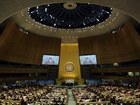The U.S. on Monday imposed sanctions on dozens of people and oil tankers across China, the United Arab Emirates, India and other jurisdictions for allegedly helping to finance Iran and its support for militant groups that launch attacks against the U.S. and its allies.
The U.S. Treasury and the U.S. State departments sanctioned more than 30 people and ships, including the heads of Iran's National Iranian Oil Co., and the Iranian Oil Terminals Co., for their role in brokering the sale and transportation of Iranian oil. The sanctioned ships move crude oil valued in the hundreds of millions of dollars, according to the Treasury.
 Full Story
Full Story
Russian Foreign Minister Sergei Lavrov arrived in Tehran Tuesday for talks with senior officials, Iranian media reported.
Lavrov is to meet his Iranian counterpart Abbas Araghchi, the ISNA news agency reported. The Russian foreign ministry said the talks would cover "Russian-Iranian relations" as well as "a number of current international issues."
 Full Story
Full Story
In a dramatic shift in transatlantic relations under President Donald Trump, the United States split with its European allies by refusing to blame Russia for its invasion of Ukraine in votes on three U.N. resolutions Monday seeking an end to the three-year war.
The growing divide follows Trump's decision to open direct negotiations with Russia on ending the war, dismaying Ukraine and its European supporters by excluding them from the preliminary talks last week.
 Full Story
Full Story
The Kremlin on Tuesday praised Washington's "balanced position" after the U.S. voted with Russia at the United Nations to avoid condemnation of Moscow's campaign against Ukraine.
"The U.S. is taking a much more balanced position which is really aimed at trying to resolve the Ukraine conflict. We welcome this," Kremlin spokesman Dmitry Peskov told reporters.
 Full Story
Full Story
More than a dozen Western leaders attended events in Ukraine on Monday marking the third anniversary of the country's war with Russia, many pledging more military aid in a conspicuous show of support for Kyiv as uncertainty deepened over the commitment of U.S. President Donald Trump's administration to helping it fend off Russia's invasion.
The fourth year of fighting could be pivotal, as Trump uses his return to office last month to press for a peace deal. But Ukrainian and European officials have been rattled by his cordial approach to Russian President Vladimir Putin and his tough words for Ukrainian President Volodymyr Zelenskyy.
 Full Story
Full Story
Friedrich Merz, on course to become post-World War II Germany's 10th chancellor after the country's election, has vowed to prioritize European unity and the continent's security as it grapples with the new Trump administration and Russia's war on Ukraine.
Pulling a divided Europe together won't be easy when many leaders are too preoccupied by domestic issues to devote much energy to answers to the continent's most pressing problems. But expectations will be high for Merz to help fill a leadership vacuum and craft a united response to recent U.S. policy shifts that have strained the transatlantic alliance.
 Full Story
Full Story
President Donald Trump welcomed French President Emmanuel Macron to the White House for talks on Monday at a moment of deep uncertainty about the future of transatlantic relations, with Trump transforming American foreign policy and effectively tuning out European leadership as he looks to quickly end Russia's war in Ukraine.
The two leaders were starting their day by taking part in a virtual meeting with fellow leaders of the Group of Seven economies to discuss the war.
 Full Story
Full Story
Russia is ready for negotiations on the Ukraine war but will only stop fighting when a peace settlement "suits" Moscow, its foreign minister Sergei Lavrov said on Monday, the third anniversary of Russia's invasion.
"We will stop hostilities only when these negotiations produce a firm and sustainable result that suits the Russian Federation," Lavrov said in a press conference with his Turkish counterpart Hakan Fidan.
 Full Story
Full Story
The United States has proposed a draft U.N. resolution that stops far short of a competing European-backed statement demanding an immediate withdrawal of all of Moscow's forces from Ukraine.
Both are timed to the third anniversary of Russia's invasion of Ukraine, which falls on Monday, when the U.N. General Assembly will vote on the nonbinding resolutions.
 Full Story
Full Story
U.S. President Donald Trump's envoy to Ukraine and Russia said on Friday that he had held "extensive and positive discussions" with Ukraine's President Volodymyr Zelensky about the three-year war with Russia and praised the Ukrainian leader as an "embattled and courageous leader of a nation at war."
Retired U.S. Lt. Gen. Keith Kellogg — who traveled to Kyiv on Wednesday and whose planned news conference with Zelensky on Thursday was changed at the last minute to a simple photo opportunity — struck a positive tone after what he said on the social platform X was "a long and intense day" of talks with Ukraine's senior leadership.
 Full Story
Full Story



